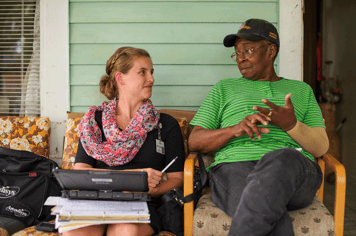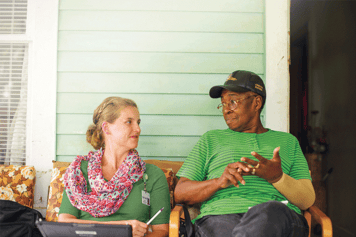Recognizing the signs that death is near for a hospice patient diagnosed with dementia is crucial for providing appropriate care and support during their final days. As dementia progresses to its end stages, several indicators emerge, suggesting that a person is nearing the end of life. Coping with this process can be challenging, so understanding and preparing yourself and your loved one for the final stages of dementia is essential.
Symptoms to Watch for at the End of Life for Hospice Patients with Dementia
Dementia can last over a decade, progresses in different stages, and there are different types of dementia. As dementia progresses, there are signs that suggest a patient is at the end stage of the disease and nearing the end of their life. This does vary for each person, so the signs that death is near can be different, as can the timeline.
As dementia progresses, a person will experience increased disorientation, restlessness, changes in sleep patterns, decreased ability to speak, increased problems with mobility, bowel and bladder incontinence and trouble eating and drinking. With advanced dementia, the person is vulnerable to infections due to lack of movement, trouble eating, drinking and difficulty swallowing. A person may die due to a related complication stemming from their dementia.
In the final stage of dementia, mental and physical functions continue to decline and there are more signs that death is near for the patient. Those signs can include:
- Loss of consciousness, or conversely, more agitated or restless
- Increased sleeping or change in sleep pattern
- No longer eating or drinking
- Unable to swallow
- Shallow, irregular breathing
- "Death rattle” caused by fluids accumulating in throat
- Drop in body temperature (you may notice cold hands or feet)
- Mottled or bluish color to skin (especially in the feet and legs)
It’s important for caregivers to be aware of these signs to provide comfort and make necessary preparations as the person approaches the end of their journey with dementia. During this time, your hospice team can educate you more on what to expect and assist with making difficult decisions.
Caregiving in the Final Stages of Dementia
It’s understandable to not want to leave the side of a loved one experiencing end-stage dementia. In fact, in one survey, more than half of caregivers reported feeling they are “on-duty” 24/7 during the end-of-life process. As a caregiver it’s important to take care of yourself during this stressful and challenging time. Take time to rest and be sure you have support systems in place.
To help ease pressure on caregivers, hospice care offers support at the end of life. At Amedisys, respite care and trained volunteers are available to spend time with patients. Additionally, hospice chaplains, medical social workers and hospice bereavement services are available to help you and your loved one navigate through these final stages. These services are a part of the Amedisys hospice team, and they consist of trained staff members to provide emotional and grief support. In addition to helping prepare for a loved one’s death, support is also provided for up to 13 months after the patient has passed.
Preparing for the Patient’s End of Life
To help prepare for the passing of a loved one living with dementia, there are several legal and financial preparations that should be considered to ensure their wishes are honored at the end of life. Ideally, these matters should be addressed as soon as possible while the patient can still make their own decisions. Here are some steps the patient can consider taking:
- Have discussions with family members to make their needs and wishes known.
- Secure the legal documents and ensure there is a trusted person who knows the location of the documents.
- Ensure a will and other estate planning documents are in place and up to date.
- Appoint a financial and health care power of attorney.
- Develop advance directives to document the patient’s wishes regarding forms of medical interventions they do and do not want (CPR, mechanical ventilation, etc.)
It's important to understand that laws vary by state, and changes in a person’s situation can influence how documents are prepared and maintained. Professional assistance can be extremely helpful during this time navigating the complexities of legal and financial matters before a loved one's passing. The hospice care team can assist the patient in finding the right resources if these steps still need to be addressed at the end of life and the patient is still able to make their own decisions or has a designated healthcare power of attorney (POA).
The Final Stages and Coping with Loss
It is equally important at the end of life for caregivers to receive emotional support. It can be helpful to understand the five stages of grief and loss as you progress through this journey. Remember that there is no right way to grieve, and everyone’s process is different. The Amedisys hospice care team is here for support, with chaplains, spiritual counselors, community resources and a bereavement coordination team throughout the process.
Understanding that death is approaching for a loved one with dementia is profoundly challenging. Preparing yourself, recognizing warning signs, and relying on the hospice team become crucial during the final stages of dementia and after your loved one’s passing. While each person’s experience is unique, being aware of these common signs that death is near for a patient with dementia can help guide families and caregivers in offering compassionate support to their loved one during this difficult time.





